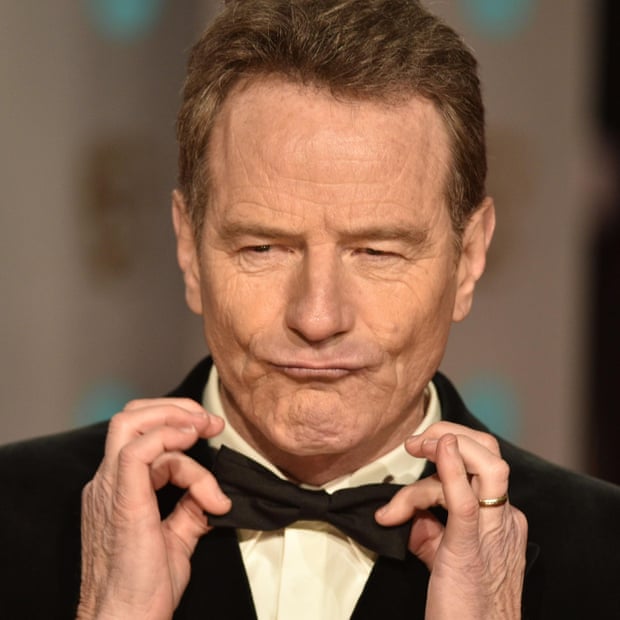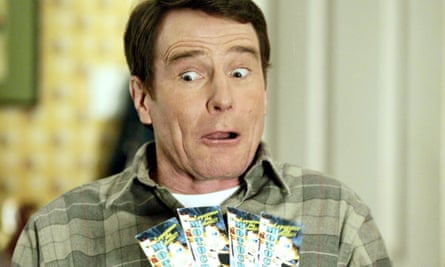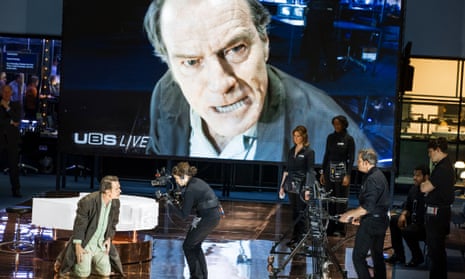The American actor Bryan Cranston received rave reviews last week for his performance at the National Theatre in Network, the stage adaptation of the Oscar-winning film from 1976 that starred Peter Finch and Faye Dunaway. Just as American film and television can’t seem to get enough of British theatre-trained actors, so we return the favour, with no one lighting up the London stage quite as much as an American screen star.
Although most of his acting career has been spent in either obscurity or overlooked supporting roles, and although he won a Tony Award for his portrayal of Lyndon B Johnson in Robert Schenkkan’s All the Way, Cranston is indeed a screen star – thanks to his celebrated role as Walter White, the chemistry teacher-turned-drug lord, in the cable hit Breaking Bad.
He has the Breaking Bad logo tattooed on his ring finger to remind him, as he’s said, that “any opportunities I have now are because of that show”. Network is the latest of those opportunities and it’s a smart piece of casting. Cranston showed in Breaking Bad that he is a master of transformation, moving, as the show’s creator Vince Gilligan memorably put it, “from Mr Chips to Scarface”.
ProfileThe Bryan Cranston file
Show

Born
Bryan Lee Cranston on 7 March 1956 in Hollywood, California, the son of Audrey Peggy Sell, a radio actress, and Joseph Cranston, an amateur boxer and actor.
Best of times
Creating Walter White, the good man gone bad in the five-season series Breaking Bad, for which he won six Emmys and two Golden Globe awards.
Worst of times
The break-up of his family when he was a young child, the anger from which, he says, he channels into his acting.
What he says
“Even the meekest person in the room can become dangerous, if they’re desperate.” “Luck, luck, luck. You have to be a good actor, a good musician. But you also have to be ready for luck.”
What others say
“I used to tell him he’d be as good as a kindergarten teacher as he would be as the president of the United States. He has a skill set that is so vast, I’ve never known anyone else who was so good at so many things.” – Jane Kaczmarek, his co-star in Malcolm in the Middle.
The transformation of Howard Beale, the news anchor in Network, is speedier but no less dramatic. One moment he’s a reliable veteran of TV news, the next he’s having a breakdown during a live broadcast, threatening to kill himself and then becoming a kind of crazed celebrity guru.
The original film, written by Paddy Chayefsky, was a satire – in many respects a prescient one – on the commercialisation of news and the mindless malleability of the viewing masses. Although a great film in many ways, it was overburdened with speechifying of the kind more often seen on stage than in cinema.
So a theatrical adaptation makes more sense in this case than in others, even if the advent of Fox News, fake news, a former reality TV star as president and seemingly weekly mass shootings by notoriety-hungry lunatics has rendered its message a little out of date in America.
But another reason why Cranston makes sense in the part is that, just as Beale becomes an unlikely star, Cranston knows what it’s like to encounter unexpected fame.
He’s justly praised for his acting skills today, but they were far from universally recognised when, for example, he was appearing in adverts for haemorrhoid cream in the 1980s. Even when he managed to secure a more high-profile gig with the part of the father in the comedy series Malcolm in the Middle, he wasn’t by any stretch a name.
And with a name like Bryan Cranston, almost a platonic ideal of forgettable, you really do have to stand out for anyone to remember it.

Still, in Malcolm and in Cranston’s occasional appearances on Seinfeld as Dr Tim Whatley, “dentist to the stars”, the interested observer could tell that he had a gift for anxious comedy. There was a restless, frustrated quality that he brought to his parts, something of a ticking bomb that would eventually explode with Breaking Bad.
It was Jane Kaczmarek, his screen wife on Malcolm, who noticed the actor Cranston most resembled in style. “He always reminded me of Jack Lemmon,” she said, noting that he was very funny but also “the real thing dramatically”.
Certainly, there was a lot more going in his work than the nice guy everyman roles his pleasant, but unremarkable, looks tended to attract. That note of underlying angst that he shared with Lemmon could, without need of a psychology PhD, be traced to the destabilising experiences of his childhood.
He grew up in the San Fernando Valley, the huge, rather bland suburb that lies beyond the Hollywood Hills in Los Angeles. His father, a boxer and failed actor, quit the family home when Cranston was 11, completely disappearing for a decade.
As he recounts in his autobiography, A Life in Parts, his mother then took to drink, the house was repossessed and the young Cranston and his brother were sent to live with their grandparents on a poultry farm in the middle of nowhere, while his sister and mother lived with another grandparent. All this, he said, left him with “a reservoir of anger and resentment and abandonment issues”.
He’s spent a good deal of time in therapy, and still occasionally visits a couples therapist with his wife of 28 years, Robin Dearden. “Our agreement is, if either of us feels like we want to go, the other can’t object,” he told one interviewer.
As a teenager, he harboured ambitions of becoming a detective, and joined a police explorer group, a programme that gives youngsters a chance to explore a career in law enforcement. But he caught the acting bug when, during a delay in a road trip with his brother, he read Ibsen’s Hedda Gabler and came to a realisation. “The idea was to do something I love and become good at, rather than something I was good at and hoped to love.”
He’s said many times since his late fame arrived that he only ever wished to make a living out of acting, that he was perfectly content with being a successfully employed character actor operating under the celebrity radar. It may even be true, but why get a tattoo to remind you of your lucky break if you’re content for the spotlight to be occupied by your peers? After all, in Los Angeles, actors who are unbothered by their middling status in the industry are as rare as snow.
Perhaps he was closer to the reality when he told me during an interview for this newspaper: “In order to be an actor, you really have to be one of those types of people who are risk-takers and have what is considered an actor’s arrogance … the type of person who wants the ball with seconds left in the game. The masses don’t want the ball. They don’t want to be responsible for not making the shot. Actors need to want that chance. Give me that chance.”

Vince Gilligan, who’d written an X-Files in which Cranston played a paranoid antisemite back in 1998, offered the actor that chance 10 years later, with his drama about a frustrated teacher diagnosed with terminal cancer who launches a new career as a producer of crystal meth.
Cranston has not looked back since, except with a hint of regret. He says that fame has changed him, and he’s not sure if it’s for the better. He has “a tendency to hide away” nowadays, he says, often having to settle for socialising with other famous actors such as Tom Hanks and Robert De Niro. These are people, he explains in his book, who don’t need anything from him or vice versa. “We can relax in each other’s company.”
Relax, of course, is not the word one associates with Howard Beale. His most famous line is “I’m as mad as hell and I’m not going to take this any more,” which probably understates his fury. Finch’s performance was so feverishly manic that it may have shortened his life – he died of a heart attack while promoting the film, and won a posthumous Oscar.
Cranston’s is arguably a more nuanced interpretation, and unquestionably less ranty in delivery. The play is directed by Ivo van Hove, the ultra-cool Belgian director who wowed critics with his productions of A View From a Bridge and The Crucible.
Van Hove has said that Cranston has the “perfect look” of a news anchorman. “That was immediately clear that he was the perfect man. I think I can perhaps totally misdirect the whole thing, but Bryan cannot do anything wrong. It feels that it’s so natural to him.”
One obvious point that Network makes is that fame authorises opinion, and Cranston is no stranger to that process. It’s unlikely anyone sought his view on politics, for example, when he was doing daytime turns on Sabrina the Teenage Witch.
But, leading up to the last presidential election, he vowed to move to Canada if Donald Trump won. A few weeks ago, with Trump in the White House and Cranston still living in Ventura County, he said that to people who hope Trump fails, he has a message: “Fuck you. Why would you want that? So you can be right?”
Beale, you feel, would be proud of both opinions and in particular the language of their expression. Having found late middle-aged stardom, wealth and acclaim, Bryan Cranston, it seems, is as mad as hell and he’s not going to take it any more.

Comments (…)
Sign in or create your Guardian account to join the discussion